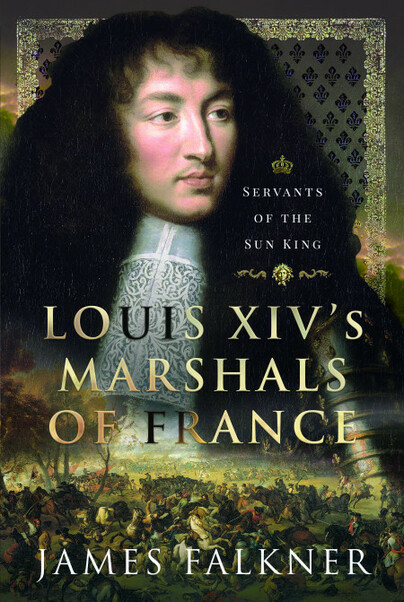Louis XIV's Architect (Hardback)
Louis Le Vau, France's Most Important Builder
Imprint: Pen & Sword History
Pages: 224
Illustrations: 16 mono illustrations
ISBN: 9781399054195
Published: 3rd October 2023
(click here for international delivery rates)
Order within the next 50 minutes to get your order processed the next working day!
Need a currency converter? Check XE.com for live rates
| Other formats available - Buy the Hardback and get the eBook for £1.99! | Price |
|---|---|
| Louis XIV's Architect eBook (7.8 MB) Add to Basket | £6.99 |
This is a study of royal absolutism in a most extreme form in modern European history, and of the nature of Louis XIV's concept of personal glory and of the embodiment of France as a new superpower. It is a study of political ideas expressed in architecture to establish Versailles as the centre of French world power and royal prestige.
It is also a personal story, full of social, cultural, and economic history of the period as seen in the life and work of Louis Le Vau, from a humble family of craftsmen, who was a self-taught architect in the early history of the profession, skilled in technical craft skills and even grand design. He was a major contributor to the architectural glories of Paris including the Louvre, Vincennes, Versailles and the College of the Four Nations. And all achieved despite interference from the great magnates of the age like Mazarin and Colbert and constant mind-changing by the King who wanted every feature in the buildings to reflect his concept of personal, royal, prestige. Le Vau was Louis XIV's First Architect from 1654 until his death and disgrace in 1670.
The social, cultural, economic and political backdrop is striking with court intrigue, scandal, corruption, luxury, indulgence and the rise of a rich bourgeoisie, but the main thrust of the story concerns Louis XIV and the royal personal ambition, and the work of a stone-cutter's son who became the Sun King's instrument.
The study is good on the more technical features of architectural history - reminiscent of Pevsner's marvellous Buildings of England series.
This history explores the era of Louis XIV through the lens of architect Louis Le Vau. Born to humble craftsmen, the self-taught Le Vau contributed to iconic Paris buildings like the Louvre and Versailles. Amid court intrigues and the mercurial king’s demands, his ambition drove him to leave an indelible architectural mark. Le Vau’s story provides insight into the social and cultural forces shaping 17th century France.
NetGalley, Andrea Romance
This scholarly work is a detailed and illustrative study for fans of architectural history. It delves into Le Vau's personal life as well as the business of the court.
Rating: 5 out of 5 stars
NetGalley, Emma Holbrook
When you first think of some of 17th century France, you might immediately think of King Louis XIV or Versailles or the Nine Years’ War—these are all important factors that made France one of the greatest powers in Europe, a force to be reckoned with, so to speak. But there is one person whose name might slip your mind who plays just as equally a huge part in why 17th century France is so remembered is that of Louis Le Vau, one of Louis XIV’s best architects and the man responsible for some of France’s greatest buildings.
As someone who eagerly devours anything related to Louis XIV or the construction of the great Palace of Versailles, I was baffled at the thought that most people probably do not know much about the talented men behind the creation of Versailles as well as many other buildings constructed during Louis XIV’s reign. In this book written by the gifted French historian Richard Ballard, we are offered a glimpse into the life and accomplishments of Louis Le Vau, born under the name Louis Le Veau but later changed to avoid the meaning of Veau which is calf—potentially saving himself ridicule down the line to be referred to as a child (essentially what a calf is, right?)
Richard Ballard explores Louis Le Vau’s greatest accomplishments including the Château de Vincennes, Château Vau-le-Vicomte, Pitié-Salpêtrière Hospital and most famously, the Palace of Versailles. Now, I don’t know too much about the intricacies of architecture but this novel allows readers who are both familiar and unfamiliar with architecture to enjoy learning about Louis Le Vac’s work on these historic buildings. We learn about how he became one of the most respected architects of his time and how his successors would try their best to go above and beyond what their predecessor was able to achieve for France.
I employ you all to give it a chance!
A fascinating account of Louis Le Vau, who was a self taught, meticulous and extremely accommodating architect to Louis the XIV, The Sun King. Le Vau learnt his trade from his father, who was a master mason. Le Vau was educated and had an elegant hand in writing as shown by surviving contracts and designs , but there are no portraits and few personal letters to give us an insight of the Man himself.
NetGalley, Daphne Sharpe
At the young age of 25, Le Vau became an architect to the King, and was promoted to First Architect t in 1654.
His masterpiece is the College des Quatre Nations, built to honour Cardinal Mazarin, First Minister and trusted advisor to the King. Today, that building is part of the Sorbonne University, and survived the French Revolution, due to it allowing access to the lower classes twice a week, to promote education.
Today, Le Vau’s work can be seen at the Louvre and the Palace of Versailles especially. At Versailles , he is best known for the State apartments used by the King and Queen, and Le Vau’s Envelope, which is a white stone facade on the garden side of the original hunting lodge, which comprises of the addition of wings to the north and south side ,that covers the original building and provides an extension to increase the footprint, whilst not damaging the original fabric of the building. Le Vau also build the first orangery at Versailles and the Menagerie. He also constructed several mansions and chateau’s for private individuals.
I enjoyed this book as it gave me the perfect excuse to rewatch the BBC series Versailles, it does show a few aspects of the relevant work executed by Le Vau.
I was extremely grateful for the very comprehensive glossary of architectural terms!
Rating: 5 out of 5 stars
NetGalley, Carol Guerrero
it was fun reading and learning about Le Vau's projects, clients, and how he approached beauty. He really did capture Louis XIV's vision of opulence and absolution. This book tells so much more about Le Vau's genius and how it immortalized Louis XIV's Versailles.
Rating: 5 out of 5 stars
NetGalley, Caroline Palmer
An interesting look at the first architect of Versailles as a royal palace and the creator of Vaux Le Vicomte and the world that created him.
Rating: 5 out of 5 stars
NetGalley, Mary Hawkes
Detailed historical research based on a number of sources on my favourite period and place ie Louis 14th in the seventeenth century, and specifically his architect. This is a masterpiece of historical information and the author is to be congratulated on this achievement. Highly recommended.
About Richard Ballard
Richard Ballard is an historian of France who specialises in cultural, social, economic and personal histories, so essential for making the backdrop of huge political movements, from revolutions and war, come to life. The period of early modern France was a zenith of French glory as typified and personalised by Louis XIV. This approach makes for absorbing reading for both specialists, students and, above all, for general readers. The author's range is wide and he has published on late medieval France during the period of the Hundred Years War and the French Revolution, all full of fascinating experiences at multiple levels, and from Paris to the provinces. He brings history into personal and even every-day contact. He writes with flair and is a good read, while deeply researching in French archives - national and provincial - and rare sources. He has long been resident in the Charent-Maritime and is now in the Avenue de Saint-Cloud at Versailles, good for archive access and modern French cultural life. He read history at Oxford and taught history at Eton College, Wells Cathedral School, Haileybury College and Westminster School. His publications include The Unseen Terror: The French Revolution in the Provinces; A New Dictionary of the French Revolution and England, France and Aquitaine: From Victory to Defeat in the Hundred Years War (Pen and Sword 2020). He is a gifted illustrator and has provided drawings of architectural buildings and features to support photographs.
Louis XIV's Marshals of France Servants of the Sun King (Hardback)
For over 70 years, from 1643 to 1715, Louis XIV fought a series of increasingly bitter wars with the Dutch, the Spanish, the British and the Austrians. During his long reign France was the foremost power in Europe and the king used his military and economic strength to expand French territory to the north into the Low Countries, to the Rhine, and south to the Pyrenees. To enable this expansion, and defend it against the powerful armies that combined to oppose him, he depended on a select group of exceptional commanders – remarkable men close to the throne, who held the prestigious title of Marshal…
By James FalknerClick here to buy both titles for £54.99
















